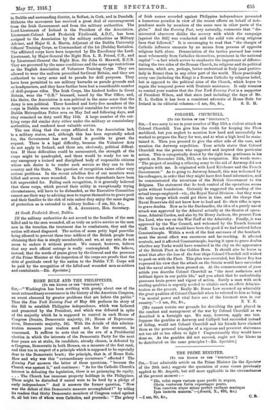HOME RULE AND THE PHILIPPINES.
[TO THE EDITOR OF THE "SPECTATOR."' Stn,—" Washington has been seething with gossip about one of the most extraordinary occurrences in the history of the American Congress, an event obscured by greater problems that are before the publio." Thus the New York Evening Post of May 8th prefaces its story of tho Bill to establish Philippine independence, which was fathered and promoted by the President, and which was defeated in spite of the majority which he is supposed to control in each Rouse of Congress (Senate, Democratic majority, 16; House of Representa- tives, Democratic majority, 34). With the details of this adminis- tration measure your readers need not, for the moment, be concerned. It suffices to note that on the eve of a Presidential election in which the interests of the Democratic Party for the next four years are at stake, its candidate, already chosen, is defeated by a Congress, Democratic in both Houses, on a measure of the first rank, and that too in respect of a principle which is supposed to be especially dear to the Democratic heart ; the principle, that is, of Home Rule. How and why was this "extraordinary occurrence" effected ? The Evening Post answers the latter of these questions, " because the Church was against it," and continues : " As for the Catholic) Church's interest in defeating the legislation, there is no gainsaying its equity, . . . The Church has immense property holdings in the Philippines. These might be disturbed if unrest were to be bred by a pledge of early independence." And it answers the former question, "How was the defeat of this Democratic measure accomplished ?" by telling its readers that thirty Democratic members of Congress voted against it. all but two of whom were. Catholics, and proceeds : " The galaxy of Irish names recorded against Philippine independence presented a humorous paradox in view of the recent efforts on behalf of inde- pendence made by members of the same race in other parts of the globe." And the Evening Post, very naturally, comments that " dis- interested observers dislike the secrecy with which the campaign [against the Bill] was conducted and the solid vote along religious lines that followed." It is encouraging to read that " the charges of Catholic influence emanate by no means from persons of opposite religious faith alone. Denunciation of the tactics pursued has come most vehemently from Catholics themselves, prominent in the national capital "—a fact which serves to emphasize the importance of differen. tiating the two sides of the Roman Church, its religious and its political interests, which are, perhaps, better understood in Italy (and particu- larly in Rome) than in any other part of the world. There practically every one (including the King) is a Roman Catholic by religious belief, but is opposed to the political aims of the Church, which hopes to regain the temporal power with Teutonic assistance. It only remains to remind your readers that the New York Evening Post is a supporter of President Wilson, and that since (and including) the days of Mr. E. L. Godkin it has been a consistent advocate of Home .Rule for
Ireland in its editorial columns.—I am, Sir, &c., S. R. H.






























 Previous page
Previous page